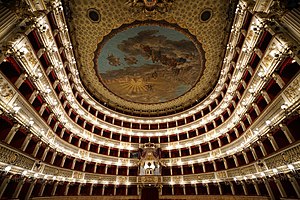Neapolitan School
In music history, the Neapolitan School is a group, associated with opera, of 17th and 18th-century composers who studied or worked in Naples, Italy,[1] the best known of whom is Alessandro Scarlatti, with whom "modern opera begins".[2] Francesco Provenzale is generally considered the school's founder.[3]
It is with the Neapolitan school...that the History of Modern Music commences—insofar as that music speaks the language of the feelings, emotions, and passions.
— Schluter[4]
The Neapolitan School has been considered in between the Roman School and the Venetian School in importance.[4]
However, "The concept of Neapolitan school, or more particularly Neapolitan opera, has been questioned by a number of scholars. That Naples was a significant musical center in the 18th century is beyond doubt. Whether the composers working in Naples at that time developed or partook of a distinct and characteristic musical style is less clear" since so little is known about the repertory.[1]
Members[]
- Francesco Provenzale (1624–1704)[1][2]
- Alessandro Scarlatti (1660–1725)
- Francesco Durante (1684–1755)[2]
- Nicola Porpora (1686–1768)
- Leonardo Vinci (1690–1730)[1][2]
- Francesco Feo (1691–1761)
- Leonardo Leo (1694–1744)[1][2]
- Giovanni Battista Pergolesi (1710–1736)[1][2]
- Niccolò Jommelli (1714–1774)
- Tommaso Traetta (1727–1779)
- Niccolò Piccinni (1728–1800)
- Gian Francesco de Majo (1732–1770)
- Giovanni Paisiello (1740–1816)
- Domenico Cimarosa (1749–1801)
- Giovanni Salvatore (1611-1688)
- (1648-1716)
- Gennaro Ursino (1650-?)
- (1651-1704)
- Gaetano Greco (1657circa-1728)
- Gaetano Veneziano (1665-1716)
- (1672-1737)
- Nicola Fago (1677-1745)
- Domenico Sarro (1679-1744)
- Giuseppe Porsile (1680-1750)
- (1680-1750)
- (1683-1742)
- Domenico Scarlatti (1685-1757)
- (1690 - 1758)
- Michele Caballone (1692-1740)
- Antonio Palella (1692-1761)
- Giuseppe de Majo (1697-1771)
- Pietro Auletta (1698 circa-1771)
- Nicola Bonifacio Logroscino (1698-1765 circa)
- Giuseppe Sellitto (1700-1777)
- (1704-1793)
- Pietro Domenico Paradies (1707-1791)
- Egidio Romualdo Duni (1708-1775)
- Francesco Araja (1709-1770 circa)
- Gaetano Latilla (1711-1788)
- Nicola Sala (1713-1801)
- Girolamo Abos (1715-1760)
- Nicola Fiorenza (?-1764)
- (1715-1779)
- Pasquale Cafaro (1715-1783)
- Ignazio Fiorillo (1715-1787)
- Nicola Conforto (1718-1793)
- Giuseppe Scarlatti (1718 o 1723-1777)
- Antonio Corbisiero (1720-1790)
- (1722-1781)
- Alessandro Speranza (1724-1797)
- Domenico Fischietti (1725-1810)
- (1727-1796)
- Pasquale Anfossi (1727-1797)
- Pietro Alessandro Guglielmi (1728-1804)
- Giacomo Insanguine (1728-1793)
- Antonio Sacchini (1730-1786)
- Tommaso Giordani (1730 circa-1806)
- Fedele Fenaroli (1730-1818)
- (1733 circa-1802)
- Giacomo Tritto (1733-1824)
- (1735-1776)
- (1740-1994)
- Gennaro Astarita (1749-1805)
- Giuseppe Giordani (1751-1798)
- (1751-1804)
- (1752-1832)
- Nicola Antonio Zingarelli (1752-1837)
- (1754-1820 circa)
- (1754-1823)
- Silvestro Palma (1754-1834)
- (1755-1826)
- (1760 circa-1814)
- Giuseppe Mosca (1772-1839)
- Luigi Mosca (1775-1824)
- (1776-1836)
- Carlo Coccia (1782-1873)
- Giacomo Cordella (1786-1847)
- (1791-1813)
See also[]
Sources[]
- ^ a b c d e f Don Michael Randel (2003). The Harvard Dictionary of Music, p. 549. ISBN 978-0-674-01163-2.
- ^ a b c d e f Paul Henry Lang (1997). Music in Western Civilization, p. 453. ISBN 978-0-393-04074-6.
- ^ Robinson, Michael F.; Monson, Dale E. (2002) [1992]. "Provenzale, Francesco (opera)". Grove Music Online. Oxford, England: Oxford University Press. doi:10.1093/gmo/9781561592630.article.O002372. (subscription or UK public library membership required)
- ^ a b Schluter, Joseph (1865). A General History of Music, p.47. R. Bentley.
- 18th-century classical composers
- 18th-century Italian musicians
- Italian Baroque composers
- Neapolitan school composers
- Composition schools
- Music in Naples
- Music stubs
